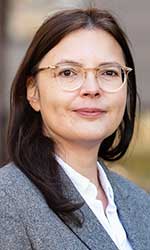Altering traumatic memories in a way that eases their burden could be the key to treating survivors of post-traumatic stress disorder and other anxiety disorders, according to one of the University of Alberta’s newest Canada Research Chairs (CRC).
Peggy St. Jacques, a psychology researcher in the Faculty of Science and CRC in Cognitive Neuroscience of Memory, said her research revolves around why our perspectives can change during memory retrieval.
“One way to think about that is if you think of a memory from your childhood, often you actually see yourself in the events, like you’re looking at a photograph of yourself,” explained St. Jacques, who is also a member of the U of A’s Neuroscience and Mental Health Institute.
This shift from an own-view perspective, which was how the memory was forged, to an observer perspective has been reported more frequently in people who suffer from PTSD. According to St. Jacques, understanding how this kind of out-of-body observer imagery affects memories could help to make these memories less disturbing.
With this in mind, her past research has focused on whether the manipulation of perspective leads to changes not only in the accuracy of memories but also changes in subjective aspects, such as how vividly someone can recall an event and the emotions associated with it.
In a recent study, St. Jacques and her team asked participants to retrieve recent memories naturally associated with seeing it through their own eyes.
The participants were later brought back into the lab and their brains were imaged while they either retrieved those memories with an own-eyes perspective, as they saw it the first time around, or retrieved them by shifting their viewpoint to an observer perspective.
Business traumatic stress disorder is real and devastating by David Fuller
The researchers found a reduction in emotional intensity when participants shifted from an own-eyes perspective to an observer perspective. They also found that this change in perspective altered the brain regions associated with remembering.
“We’re really interested in how shifting perspective during retrieval can actually modify and update memories,” said St. Jacques.
“Our memories are really important to our sense of self, but often in a lot of mental impairments like PTSD or social anxiety, there can be changes in the viewpoints of people’s memories.”
She said the focus of this CRC appointment is to give her the time and resources to delve into the missing piece of the puzzle, which is understanding how our viewpoint affects how we form memories.
“Although we typically experience the world through our own eyes, negative events like the pandemic, for instance, make it apparent that we do often see ourselves in those events and that’s how we are potentially forming memories.”
St. Jacques added that the CRC funding means so much more than just the ability to further her research program.
“As an Indigenous woman in science, receiving the CRC also means being a leader in the field and the responsibilities that go with that, such as supporting equity, diversity and inclusivity in science.”
Established in 2000, the Canada Research Chairs program is part of a national strategy to make Canada one of the world’s top countries in research and development. Chairholders aim to achieve research excellence in engineering and the natural sciences, health sciences, humanities and social sciences.
| By Michael Brown
This article was submitted by the University of Alberta’s Folio online magazine. The University of Alberta is a Troy Media Editorial Content Provider Partner.
© Troy Media
Troy Media is an editorial content provider to media outlets and its own hosted community news outlets across Canada.



